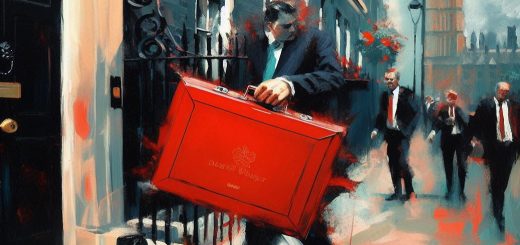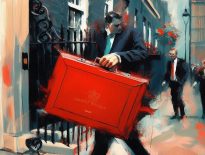Autumn Statement November 2022

Today’s post takes a look at the usual speculation in advance of the Autumn Statement in November 2022 and at what actually happened.
Contents
Autumn Statement November 2022
Here we are again, not sooner than expected (( Kwarteng also planned another statement in November )) but with a new PM and a new Chancellor. (( I find it staggering that the Parliamentary party can simply ignore the Tory membership vote and impose their own leadership candidate, but that’s a topic for another day ))
- Small-state government now appears to be off the agenda for the remainder of my lifetime, but the slightly better news is that the magic money tree is less popular than it was pre- and during Covid.
Jeremy Hunt has already rolled back almost all of Kwarteng’s changes (with the exception of the NIC cut).
- The Autumn Statement is all about plugging a “fiscal black hole” of around $50 bn a year with a combination of tax hikes and spending cuts.
I have no hope of any Tory policies being enacted today. (( Kwarteng had a shot at a few, but he added some with terrible optics and forgot to balance the books ))
- My fear is that we head back to some bizarre Gordon Brown/George Osborne mish-mash.
This is the seventh budget of this parliament, which now has little more than a couple of years to run.
Hunt does not have a promising economic backdrop to his first budget:
- Dealing with Covid has cost an absolute fortune, and the energy price cap threatens to cost even more
- Inflation is very high (though it might have peaked) and coupled prove difficult to shift
- Interest rates are being raised to combat inflation, but the collateral damage could include a recession, high unemployment and lower prices for risk assets
- There is tabloid pressure to insulate households from the impact of what they see as a “cost-of-living crisis”
- We have a chronic productivity problem, an ageing population and immigration is a hot topic – so the path the growth is not clear
- All spending cuts are now branded austerity and the hopelessly inefficient NHS is still treated as a national religion.
- To this has been added a second untouchable doctrine – Net Zero.
I wouldn’t start from here if I were you, and Hunt agrees, having spoken of “decisions of eye-watering difficulty”.
- He also said that “everybody” will pay more tax after the Autumn Statement.
Hunt said:
Sound money and a stable economy are the best ways to deliver lower mortgage rates, more jobs and long-term growth. However, there are no easy options and we will need to take difficult decisions on tax and spending to get there.
So we have been warned.
Speculation
Remember that a lot of speculation relevant to an investment blog is produced by investment firms and accountants in order to provoke action (overreaction?) from clients and investors in advance of draconian measures that rarely appear.
- We are expecting tax hikes and spending cuts this time (perhaps to £50 bn between them), but the volume of items floated will be much larger than those that are enacted.
Notes in blue indicate what actually happened.
Income tax and NIC
One of the most widely touted changes is the expansion of threshold freezes to more taxes and for longer time periods (perhaps to 2028 rather than 2026).
- Freezes are particularly effective during periods of high inflation, as the “fiscal drag” effect of more money falling into higher-taxed bands is increased.
Thresholds affected could include income tax and NICs (as well as the LTA on pensions).
- There could also be tax rises to any of the income rate bands and on dividends, and possibly on NICs for higher earners
The dividend allowance could be cut or removed.
- And the higher rate income tax threshold might be reduced.
We did get the threshold and allowance freezes.
- In addition, the 45% rate now cuts in at £125K of income, down from £150K.
The start of the new band is where the existing 60% band (40% in tax and 20% in personal allowance taper) from £100K terminates.
The dividend alliance will fall to £1K next year and to £500 the year after that (( Assuming a Tory government is still in place ))
Cost of living
The energy price cap will no doubt stay until April 2023, but we might find out more about how (or if) it will work from then.
- A windfall tax on energy firms could be back on the agenda.
Nothing was expected on VAT, not least because raising consumption taxes would push up inflation.
The energy cap was extended for a year but will rise to £3000 pa for the average family.
Windfall taxes on energy firms were increased.
Capital gains and Inheritance tax, wealth taxes
CGT and IHT bands could be frozen or cut, and CGT might be aligned with income tax.
- There has been no suggestion of a wealth tax, which is more of a Labour policy in any case.
I saw at least one suggestion that Business Property Relief for IHT might be removed.
- This would have serious implications for AIM stocks (to which BPR applies).
Another extreme idea is to abolish the CGT uplift that occurs on death, making estates (or potentially those inheriting assets) subject to CGT.
CGT rates didn’t change, but the CGT allowance will be cut from £12.3K to £6K next year, and to £3K the following year.
- This is bad news for all investors, including buy-to-let.
The IHT allowance was also frozen to 2028.
Corporate tax
A return to the original plan to increase corporation tax from 19% to 25% has already been announced.
I didn’t spot anything else on corporate taxes.
Investments and pensions
The hot item here was whether the triple lock on the State Pension would be restored.
- The link to earnings was removed last year because of the large rebound in earnings following Covid, but Sunak confirmed at the time that it would return this year.
The likely extension of the freeze on the LTA was mentioned earlier.
The perennial favourite of scrapping higher rate income tax relief on pension contributions resurfaced once more.
- And the annual allowance might be cut from £40K to £30K or £20K (as per the ISA).
Nothing major was expected on ISAs, but VCTs and EIS remain interesting.
- They are subject to sunset clauses in 2025, and though Kwarteng pledged his support in his speech, there was no follow-up.
The triple lock was retained, as was the £40K annual allowance and the higher rate income tax relief.
- I didn’t spot anything about the LTA or VCT/EIS, but the industry is reacting as if the tax shelters have been extended.
Property
Nothing was predicted on stamp duty.
- One thing to look for was a relaxation of the 3% cap on council tax increases.
The Economist had called for a general property tax of 0.5% pa (!) and the abolition of the property allowance for IHT.
- Let’s hope that the Chancellor wasn’t listening.
Even wackier was the suggestion that the CGT exemption on primary homes would be removed.
- That would trap me in my current home (( Which I have owned for close to 30 years )) and lock up the top end of the property market.
- And it wouldn’t even raise much money, as those with potentially the most to pay would be most motivated to stay put.
There was also talk that the “beneficial” tax treatment of holiday lets (relative to the punitive taxation of regular buy-to-let) might be removed.
- This would be poor timing for me, as I’m thinking of buying one next year. (( But at least I didn’t buy one last week ))
The present stamp duty cut below £500K will end in 2025.
Sin taxes
Fuel duty might be cut to combat the COL – but probably not.
- In fact, it was increased.
Green Stuff
It was reported that Hunt was looking at taxing electric cars for the first time.
- Most of the motoring tax comes from fuel duty, and this will disappear as people switch over to battery vehicles.
Vehicle excise duty is a much smaller tax (usually£165 pa) and would need to be astronomically bigger to replace fuel duty.
- So I would expect a nominal tax on electrics, probably to start after the next general election.
Electric cars will be included in the VED scheme from 2025, but I didn’t spot any details.
Surprises
I didn’t spot any, but that is increasingly the pattern in recent years.
- We get dozens of leaks in advance, of which around half (if we are lucky) wind up in the final statement.
Conclusions
From an investor’s point of view, the main news is the shrinking of the dividend and CGT allowances to the point where they are of no practical value.
- We must rely even more than before on tax shelters (SIPPs, ISAs, VCTs and EIS).
I’ll put together a separate post on post-budget tax planning and how to use a GIA in the coming weeks.
Personally, I’m pleased to see that the state pension triple lock has been retained, not least because the UK pension is so mean compared to those of other rich countries.
On the downside, increasing other benefits at the rate of inflation will do nothing to bring that rate down.
- Nor will the extension of the energy cap or the increases in fuel duty and the minimum wage.
And the increase in corporation tax to 25% will make the UK very uncompetitive for international businesses.
I’m not against balancing the books, but in the long run, the UK faces a growth crisis, driven by ageing demographics and low productivity.
- A vague aspiration to become the next Silicon Valley is unlikely to be sufficient to fix this.
The OBR forecast is that real disposable incomes will be below pre-Covid levels even in 2028.
- Until next time.
















